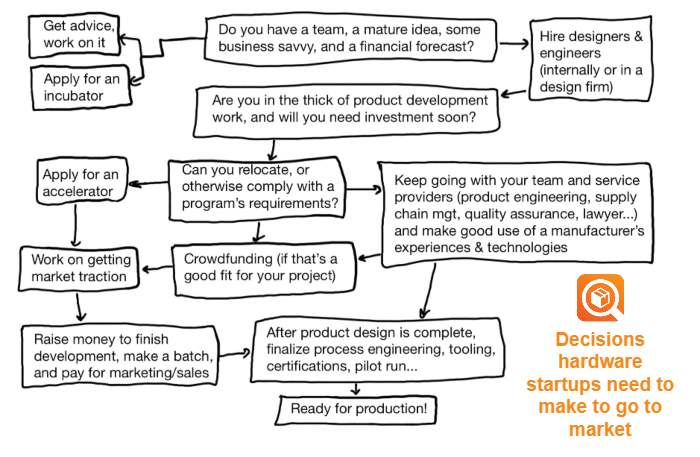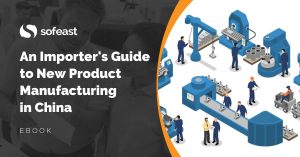If you are a startup at a very early stage with growing your business and getting products to market, you have a few choices in order to get on the right path. Do you go with Startup Incubator VS Accelerator, or dispense with them and just go it alone?
Here are the options in more detail (we’ll focus more on hardware startups, rather than purely software startups, as working with them is where most of our experience lies):
A lot of startups are led by entrepreneurs who have a great idea for a product, but lack expertise in other areas. Having an idea alone isn’t going to lead to a prospering company without assistance to develop it, go through prototyping, and then produce the product; let alone, find funding, grow the business, and find backers or customers.
Incubators and accelerators provide startups with the backing to grow, but what are they, and what are your alternatives?
We have reflected on our observations and done some research. Here is what we have found. This is especially applicable to projects for new high-tech products (typically combining hardware and software).
Incubator VS Accelerator
An incubator takes startups at a very early stage and provides them with a place to work and mentors with varying skills to help firm up their business and product offerings.
Accelerators take a more mature startup and allow it to quickly grow with funding, structured and thorough mentoring, and a large network.
Incubators tend to run for a longer period of time, often with startups in a shared co-working space and an end goal of fostering innovation and progressing a rough idea to a solid company and business model which is eventually on-track to be pitched to would-be investors.
On the other hand, accelerators take place over just a few months, usually also in one location, and they usually accept startups that already have what they perceive to be a good product idea and some evidence of market traction. In return for their investment, they often take equity in the startup and push them hard to be market-ready and capable of gaining further investment after this short time period.
(Note: there are many variations and flavors, as each of these organizations tries to differentiate from the others. So, I am necessarily making generalizations that can’t be true 100% of the time.)
From Idea To Market
It’s hard to know which option is best for your startup, so let me try to outline some of the main points you need to know in this video:
Startup Incubators
When comparing incubator VS accelerator, many startups are really uncertain what the differences between them, or even co-working spaces, really are!
A startup incubator exists to bring in entrepreneurs who only have an idea for their product and may not even have incorporated the business yet.
In general, they’re set up a little like a co-working space. The startups are brought together in a shared space where they have a workspace and facilities provided to them. This may be for free for the duration of their contract, or on a cheap lease.
The incubator will then provide mentorship and various events to help give them the tools they need to take their idea and turn it into a viable business.
By working in the incubator, the startup will be focusing on:
- Solidifying and honing its product idea
- Creating a great business plan
- Exploring and deciding where they fit into the market and what consumer (or business) needs they address
- Learning how to build the business, including running it, finance, legal issues like registering patents and IP, marketing, etc
- Joining seminars (and maybe one to one sessions) with mentors who provide relevant expertise for their niche or where they are at with their business
- Networking with other startups and possible investors
Incubators usually don’t provide seed investment for a slice of equity; rather they provide a working space, mentoring, and community to assist entrepreneurs with an idea to get to the point where they are ready to start a business.
If they are ‘free,’ they may be funded by organisations (sometimes VC firms) or local government bodies who have a vested interest in finding the next big thing. This is why incubators can often be based in one area or focused on startups in a certain niche. For instance, it benefits a local authority to invest via an incubator into local entrepreneurs who can then go on and start businesses that bring in revenue and employment to their areas.
A good example of a local authority’s incubator would be Futureworks NYC Incubator which is partly run by the New York City Economic Development Corporation and is free to selected NYC-only startups.
On the other hand, London’s FFWD is a low-cost (but not free) incubator that is open to most applicants and has links with numerous large VCs, organisations, and companies.
I’ve also written about some Chinese incubators before here, too 👉 Incubators in China for Developing a new Electronic Hardware Product.
Most incubators have a website where you can check their program, costs (if any), and the companies or mentors who will be providing their services. This will help applicants decide if they’re a good fit.
Is an incubator right for you?
- If you have not incorporated a company or created a financial forecast yet, an incubator will help you to do these early-stage activities the right way
- If you have started the initial research and the product design, and you know it will take many months, you may benefit from some mentorship — that’s what may lead you to a government grant or a R&D partner that makes a big difference.
- If you have already done the above and are looking for an investment then an accelerator should be a better choice
Startup Accelerators
A startup accelerator is more focused on companies with a more solidified business plan and product idea; often they have been incorporated and founders are already working towards developing a product for launch, and some may even have already gained funding or investment of some kind.
Accelerators generally have a fairly short duration, around 3 months, and this takes the form of a fairly intensive program where successful applicants’ startups are mentored by specialists in their niche with the goal of getting them to the point in just a few months that may otherwise take a year or more.
Unlike incubators, accelerators commonly provide a seed investment (this can be anywhere between a few thousand dollars up to twenty, fifty, or even one hundred thousand!) in return for equity. Startups are also usually provided with a workspace, access to manufacturers and investors, and the program culminates in a demo day where the founders pitch their projects to numerous possible investors.
(Note: with the COVID 19 pandemic, relocating to one central place is quite difficult in some cases, and it makes things more complicated. Each program responds to this in their own way.)
As it’s in the accelerator’s interest for its startups (of whom they own equity) to be a success, the founders will be supported to assure that the products they pitch are legitimate and (as much as possible) have market traction, address consumers’ issues, and are safe, compliant, and well-designed.
Expect intense coaching and mentoring on:
- Product design and development
- Marketing
- Prototyping and certification to assure market-readiness
- Scaling the business
Many founders apply for accelerators, so it may be a struggle to qualify unless your idea really stands out and you’re seen as being a business that can be scaled quickly. Of course, the rewards are such that you are more likely to have the backing of investment capital and expertise to grow rapidly.
Some good examples of accelerators are Techstars, Activate Capital, and Y Combinator. Their seed funding ranges from $20,000 up to $100,000+ and they all have links to various VCs and large organisations that may be interested in their successful startups.
Is an accelerator right for you?
- If you already have founders, a team, a solid product idea that has been designed and developed (at least to a degree) and your next step is to find investment and go to market, then you may be ready for an accelerator.
- Signs of market traction (distribution deals, a successful crowdfunding campaign…) are very helpful for your admission. They know that one of the biggest risks is developing a solution in search of a problem!
- You will have to comply with a program that will keep feeding you “best practices” for building a 100 million USD business. You will be on the route for VC funding, with the implications of that model (loss of control; risk of founders getting kicked out; risk of the company taking huge bets and flaming out).
Going it alone
Having assessed incubator VS accelerator, there is a third option open to startups, too.
If you are not joining an incubator or accelerator, you may still gain a few benefits from being in a co-working space if your team is all located in the same city. A good co-working space provides a ready-made network (the startups and businesses around you) as well as occasional events (such as talks, seminars, etc by speakers, mentors, and companies) aimed at helping small businesses and startups.
Beyond that aspect, and more importantly, there are several things you will need to get to grips with, including the following:
- Make sure you don’t give your intellectual property away. A good business lawyer can help.
- Finding good engineers to design the product (see our lists of design firms and prototyping shops).
- Finding good people to build your supply chain (pick and source the components, fill up the BOM, select an OEM or CM…). That’s what companies like ours do.
- Make the right decisions all along. I highlighted the most common mistakes, and how to avoid them, in this detailed guide on new product manufacturing.
Conclusion
The startup’s conundrum, then, is to choose between incubator VS accelerator VS going it alone.
To recap, an incubator may suit you if your startup is in the very early stages, where you have a good idea, but very little else. They will give you space and guidance to hone the idea and be ready to start building a business out of it.
An accelerator is more appropriate for startups who already have a solid product design, a team, and some signs of market traction (such as a successful crowdfunding campaign behind it). They to turbo-charge your startup’s development with funding in return for equity, and intense mentorship and a roadmap that they believe will grow your company rapidly and, therefore, make their investment more valuable.
Finally, going it alone is also possible and may be preferable if you’re not comfortable with giving away equity to an accelerator and want to grow in your own time and have more autonomy, but you’ll need plenty of advice (if you need help, ask me) and to carefully weigh the following decisions:
Related blog posts to also take a look at when considering incubators or accelerators
- Pros and Cons of Crowdfunding (Kickstarter/Indiegogo) for Startups
- 7 Typical Pitfalls for Hardware Startups Producing in China
Are you designing, or developing a new product that will be manufactured in China?
Sofeast has created An Importer’s Guide to New Product Manufacturing in China for entrepreneurs, hardware startups, and SMEs which gives you advance warning about the 3 most common pitfalls that can catch you out, and the best practices that the ‘large companies’ follow that YOU can adopt for a successful project.
If you’ve decided to go it alone, this guide introduces a lot of the points you’ll need to consider in order to get to market.
It includes:
- The 3 deadly mistakes that will hurt your ability to manufacture a new product in China effectively
- Assessing if you’re China-ready
- How to define an informed strategy and a realistic plan
- How to structure your supply chain on a solid foundation
- How to set the right expectations from the start
- How to get the design and engineering right
Just hit the button below to get your copy (please note, this will direct you to my company Sofeast.com):



